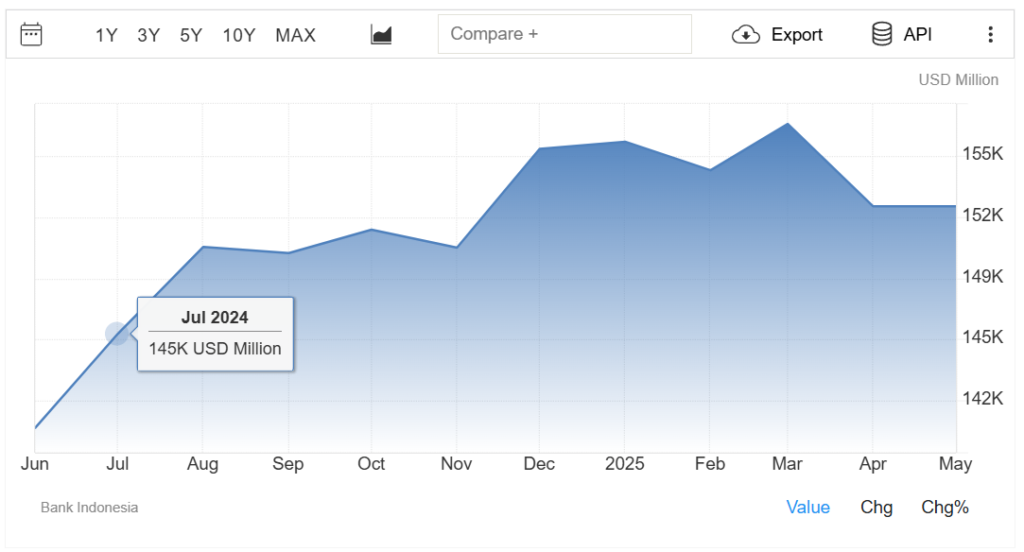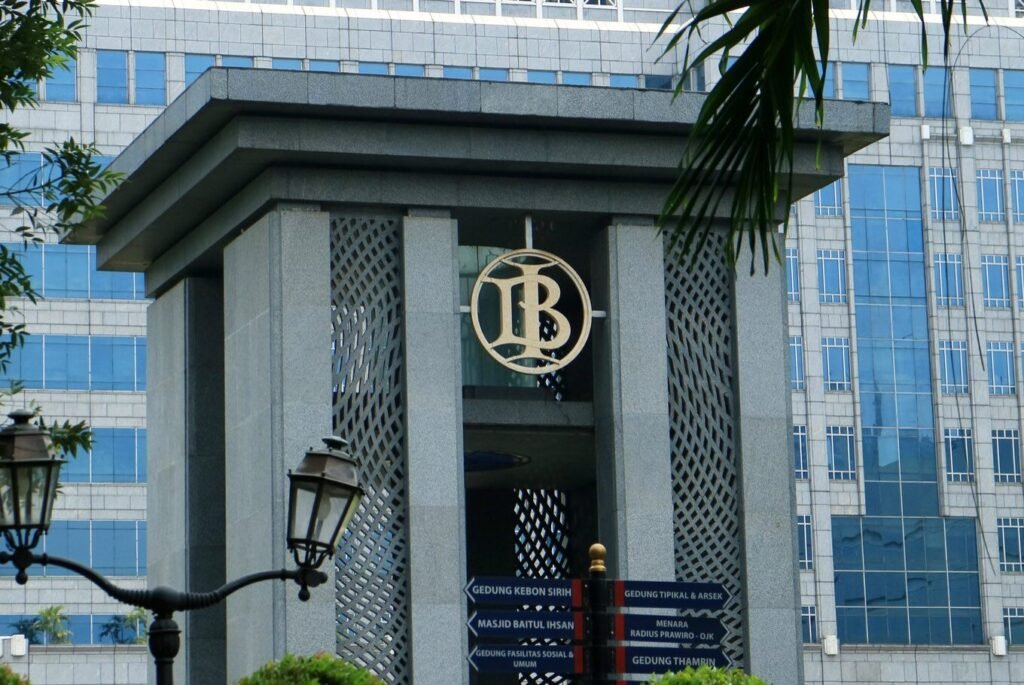What Is BI Forex Intervention and Why Is It Still Used in 2025?
BI forex intervention refers to Bank Indonesia’s effort to stabilize the rupiah through direct or indirect operations in the currency market. Although exchange rates in Indonesia are officially floating, BI doesn’t leave the rupiah entirely up to market forces. In 2025, with global economic conditions remaining unpredictable—driven by energy price shifts, U.S. monetary policy, and regional trade uncertainty—this form of intervention is still a vital part of the central bank’s toolbox. The goal is to prevent sudden, disruptive currency movements that could threaten inflation control and economic growth.
Why Does Bank Indonesia Step Into the Forex Market?

Source: TradingEconomics
In 2025, the stakes remain high for Indonesia’s economy. A sudden depreciation of the rupiah could make imported goods more expensive, add inflationary pressure, and discourage investor confidence. On the other hand, an overly strong rupiah might hurt export competitiveness. That’s why Bank Indonesia intervenes—not to fix the exchange rate at a certain value, but to reduce excessive swings. The bank’s interventions aim to support a stable financial environment that gives businesses and households the predictability they need to plan ahead.
What Methods Does BI Use to Influence the Exchange Rate in 2025?
Bank Indonesia doesn’t rely on a single method. Instead, its 2025 approach includes a combination of direct and indirect actions. These include selling U.S. dollars from its reserves to meet surging demand or prevent rapid depreciation, conducting Domestic Non-Deliverable Forward (DNDF) transactions to ease future volatility expectations, and even adjusting interest rates to influence capital flows. BI also monitors currency futures and swap markets closely, stepping in when short-term speculation threatens long-term stability. The coordinated use of these tools ensures BI’s responses are precise, not reactionary.
When Does Bank Indonesia Usually Intervene in the Market?

Source: TheJakartaPost
Bank Indonesia does not intervene constantly, nor does it announce its actions in real time. Instead, it operates selectively—usually during periods of high volatility, rapid capital outflows, or external shocks that push the rupiah out of sync with underlying fundamentals. For example, in early 2025, as investors reacted to shifting U.S. bond yields, the rupiah faced short-term selling pressure. BI intervened quietly, ensuring that order returned to the market without creating unnecessary panic or headlines. Timing and subtlety are key to the bank’s credibility and effectiveness.
Has BI Forex Intervention Been Effective in 2025?

Source: The Star
So far in 2025, BI forex intervention has managed to maintain exchange rate stability despite challenging conditions globally. The rupiah has seen some ups and downs, but none have spiraled into crisis territory. The interventions have helped anchor market expectations, limit the pace of depreciation, and signal that BI is ready to act when needed. These outcomes strengthen investor confidence—both locally and abroad—and allow inflation and growth forecasts to remain within manageable bounds. Intervention may not eliminate all risks, but it plays an essential role in cushioning economic shocks.
Is Bank Indonesia Transparent About Its Forex Strategy?
In 2025, Bank Indonesia maintains a deliberately measured stance on transparency. It does not reveal the timing or size of its market operations, but it does openly communicate its broader policy objectives. BI issues regular monetary policy updates, quarterly economic outlooks, and foreign reserve data that reflect its underlying strategy. The rationale is simple: full transparency in a forex-sensitive environment can be counterproductive. By keeping some room for discretion, BI avoids telegraphing its moves to speculative actors, maintaining its ability to surprise the market when necessary.
Is Relying on Forex Intervention Sustainable?
Bank Indonesia doesn’t treat forex intervention as a permanent solution—it’s more of a pressure-release valve. In the long term, sustainable currency stability depends on strong fundamentals: healthy growth, controlled inflation, disciplined fiscal policy, and resilient trade performance. BI forex intervention in 2025 serves as a bridge during periods when those fundamentals are temporarily overwhelmed by external forces. Its effectiveness lies in being temporary, targeted, and reinforced by broader macroeconomic stability measures. It’s a tool for risk management—not a substitute for reform.
What Does This Mean for Ordinary Indonesians in 2025?
For most people, currency policy feels like something that only concerns economists or bankers. But its effects are more tangible than they may seem. When the rupiah weakens significantly, everyday essentials like fuel, cooking oil, electronics, and even medicine can become more expensive. Businesses may hold back on investments or raise prices. In 2025, BI forex intervention helps soften these impacts by keeping the rupiah in a more predictable range. That predictability supports purchasing power, protects household budgets, and maintains stability in jobs and wages.
Conclusion: Why BI Forex Intervention Remains a Key Policy in 2025
In 2025, BI forex intervention continues to be a balancing act—one that reflects the complexity of managing a currency in a globally connected world. With the rupiah constantly exposed to external pressures, from interest rate shocks to regional instability, Bank Indonesia plays a vital role in keeping the currency anchored. Through a careful mix of policy tools, the central bank works behind the scenes to preserve calm in the market—making sure the rupiah remains a reliable foundation for the nation’s economy. In a year of shifting global tides, that steady hand still matters.






